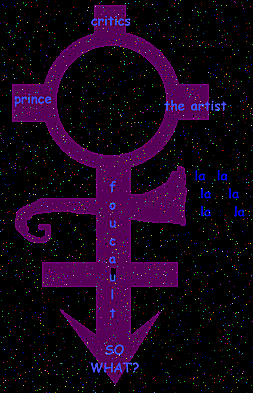

Granted, the "author-function" proper is not rooted in the identity of the artist,
rather it is the grounded in the disciplined classification of the artist based on
analysis of his or her works. However, as can be seen Prince knows the contribution
which interview situations make to the frameworks in which society will classify him.
Indeed, in discussing his interview practices, reporters reveal
his intense involvement
in making sure that he controls all of the conditions in which his voice becomes public.
Prince/ sounds quite aware, in fact, of the functionality of
authorship
in our society when he discusses his music as well.
sounds quite aware, in fact, of the functionality of
authorship
in our society when he discusses his music as well.
Following is a look at the difficulty within this artist's world of establishing simple
elements
of his childhood. He shifts the focus from media to interviewers to himself to his
management--making clear (or unclear) the
mediated, negotiated nature of his identity.
Musician: I once heard you described as a child prodigy.
Prince: Don't. That's all fabricated evidence that the management did to make it happen. I
don't want to say that I was anything less than what they thought, but I just did it as sort
of a hobby and then it turned into a job and just a way to eat and now I do it as art.
A. If people would go back and read in the newspaper all the things that have been
written about me that wasn't true, they'd know, and they could judge things for
themselves.
I don't know what happened. The media has lost control. It's got too much power. What
do these people think? That they're never going to see me again?
The instability in his very foundation makes difficult the ascription of a critically based author function when both he and critics use it to understand the nature of his work.
- I always said that one day I would play all kinds of music and not be judged for the color of my skin but the quality of my work, and hopefully I will continue.
-
Though he is half white, he identifies completely as a black man and talks about the lack
of images for black children in movies and television.
- His high-minded supporters might say those are normal protective feelings for somebody who was kicked onto the streets by his beloved father at age fourteen.
- It's also worth bearing in mind that early in his childhood the young Prince Rogers Nelson ran away from his mother in order to be with his father, a musician.